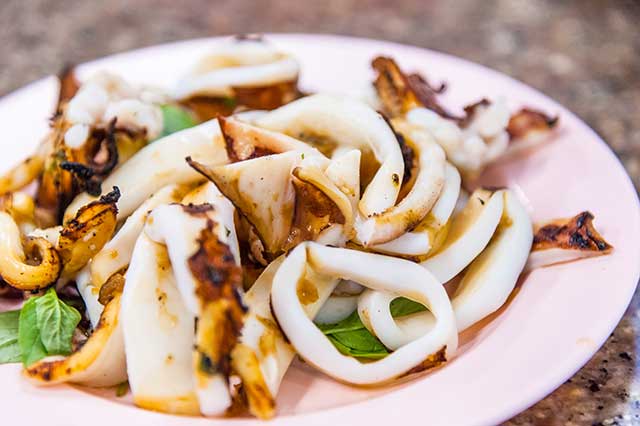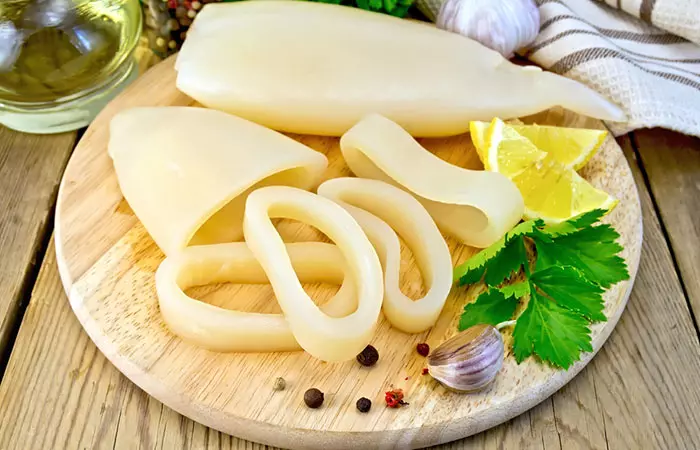Squid, a form of seafood, is a gastropod that belongs to the same family as octopus, scallops, and shellfish. Squid meat is translucent, pale white colored with a pleasing piquant flavor and rubbery texture. While it can be prepared as sushi or broiled and added to various types of pasta dishes, it is best relished sautéed. This adds up to its already high-calorie content, making people ponder how much and how frequently they can consume it. Further in this article, we discuss some of the main squid benefits, nutrition facts, and potential risks, to help you decide better.
Potential Health Benefits Of Squid
Most health benefits of squid have been primarily linked to its high content of protein, trace minerals, and omega-3 fatty acids. Let’s comprehend this further below.
Rich In Heart-friendly Omega-3 Fatty Acids
Squid contains a reasonable quantity of beneficial omega-3 fatty acids. Omega-3 fatty acids, with their anti-inflammatory properties, perform many important functions in the human body, particularly in reducing the risks of cardiovascular and other chronic diseases.
Good Source Of Muscle-building Protein
Squid provides 15.6 grams of protein per 100 g serving. Also, squid is a complete protein which means that it contains adequate quantities of all nine essential amino acids required for constructing the tissues and muscles of our body.
Low In Poisonous Mercury
Squid is one of the healthiest seafood options when it comes to mercury contamination. The average mercury content in squid meat based on 36 commercially available samples was found to be 0.024 ppm (parts per million). Among the popular seafood options, calamari fares better than tuna, sardine, crustaceans, and lobster.
Contains Brain-healthy Choline

With 65 mg of choline per 100-gram serving, calamari is an excellent source of choline after eggs. Choline is an essential trace nutrient that is crucial for brain and liver health. It also helps prevent spinal abnormalities in developing fetuses. According to the National Health and Nutrition Examination Survey, only 10.8% of Americans satisfy the adequate intake (AI) recommendations for choline. Including squid in your diet can help get more of this vital nutrient.
Rich In Antioxidant Selenium
Squid contains about 44.8 µg of selenium per 100 g of its serving, which is equivalent to 64% of the RDA (recommended daily intake). Selenium is a vital trace mineral that has essential antioxidant properties. In the human body, selenium activates various selenoproteins that help strengthen your immunity and may protect you from numerous health issues related to cardiac health and cancer.
Potential Risks Of Squid
Squid is generally considered a secure dietary option when consumed in moderation. The only things you need to be mindful about are their high cholesterol content and any potential allergic reactions.
Shellfish Allergy
As with any type of bivalve, squid entails the danger of an allergic reaction just like its mollusk cousins— oysters, mussels, and clams. One of the main allergens detected in squid is believed to be a squid muscle protein called tropomyosin.
While allergy to the crustacean species like crab, lobster, or shrimp is more common than mollusk allergies, there is a possibility of cross-reactive allergic reactions. That means you might be averse to squid if you are already allergic to any crustaceans.
Symptoms might include moderate rashes, irritation, urticaria, swelling, or dyspnea. Allergic reactions might become severe very rapidly and you should speak to your doctor if you suspect any uneasy reactions to the consumption of squid.
Ruth Winter, a blogger, described her unpleasant experience with squid allergy after consuming calamari in her restaurant. She said, “After lunch, my belly began to swell. I found it hard to believe but when I began to wheeze and cough, I took the appropriate allergy medicine my doctor had previously prescribed. I was very uncomfortable but I survived.”
Read Also: Guide to Cooking Tasty Roast Chicken
High In Cholesterol
With 233 mg of cholesterol per 100 g, calamari is an excellent source of dietary cholesterol. The cholesterol content can further increase based on the cooking and preparation of the dish. For instance, having fried squid rings though delicious would not be a suitable option for individuals with cardiovascular concerns. Baking, broiling, or over-roasting can help you enjoy squid in a healthful fashion.
Now, fried squid rings are often dubbed “calamari” in certain regions of the globe. While that may make it sound more exclusive and expensive, “calamari” is actually another kind of cephalopod. Let’s grasp the fundamental differences between squid and calamari in the next section.
Cooking With Squid

You can get raw squid from your fishmonger or at the seafood counter of most major supermarkets. Fresh squid appears sleek and glossy with a subtle, fresh scent of the sea. If it scents rotten or appears wrinkled and lifeless, you should avoid purchasing it. Also, if you don’t locate fresh calamari, you can search for preserved or desiccated squid as well.
When it comes to taste and texture, calamari is mildly sweet and tender and can easily incorporate the flavors of other ingredients, herbs, and seasonings in your dish. Though squid lends well to different culinary methods like grilling, sauteing, frying, or even slow-cooking, it is very time-sensitive and can turn brittle and gelatinous on overcooking.
Although the squid tentacles are also edible, it is the body that is the main portion of flesh. While it can be stuffed and prepared as a whole, it is commonly sliced into crosswise segments, flat portions, or simple circles and fried to make the most of its texture and flavor.
Here Is How You Can Prepare The Calamari Disks For Further Cooking:
-
Put the squid rings or segments into a large basin of cool water. Move and gingerly cleanse each ring with your palms.
-
Be cautious to remove any fragments of connective tissue or membrane from the rings.
-
Drain the cleansed squids with a strainer.
-
Boil enough water in a large saucepan or stockpot.
-
Add in the calamari rings and allow them to simmer for 2 minutes.
-
Drain out the cooked rings and transfer them to a clean receptacle.
-
You can then use the squid rings immediately or let them chill down for later use.








